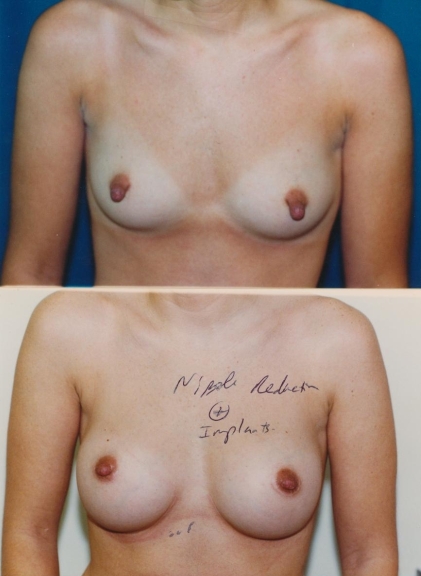ELECTIVE NIPPLE EFFECTS BREAST SURGERY
Posted On: September 15, 2016 Author: The Office of Dr. Stuart Linder Posted In: Breast Augmentation, Breast Implants, Breast Lift, Breast Reduction, Breast Revision, Breast topics, Nipple Reduction, Plastic Surgery
The effects on the nipple from breast augmentation, breast revision, breast lift and breast reduction can be significant. They can include loss or gain of increased sensitivity to the nipple areolar complex. The nerve supply is the 4th lateral intercostal nerve that supplies the nipple areolar complex coming from the side of the chest around the muscle, the peck major, and underneath the nipple. If this is damaged, you could have obvious complete loss of the nipple sensitivity.
Sensitivity is associated with preservation of that nerve. This nerve can be stretched with neurapraxia or cut completely or blunt traumatically torn during lateral dissection of a breast augmentation procedure with either saline or silicone implants.
The loss of sensitivity ranges throughout the United States somewhere between 4 and 5 percent, by reports, for breast augmentation. The number greatly increases with breast lifts and breast reductions which can reach up to 10 to 14 percent. Hypersensitivity can also occur to the nipple areolar complex with new neuronal regrowth of nerves underneath the periareolar incision which could lead to hypersensitivity.
In general, after eight weeks usually the sensitivity returns to a normal state as baseline preoperative. However, it can take 12 to 18 months for complete sensitivity to return or at least partial. Breastfeeding can also be lost with all three procedures and again similarly the numbers increase as you go from breast augmentation to breast reduction.
Any patients who will undergo a breast implant, breast lift or breast reduction, must be cognizant of the fact that they may certainly lose sensitivity and/or the ability to breast feed or lactate. Certainly, the technical skill of the surgeon being Board Certified with the American Board of Plastic Surgery should reduce the incidence of these deleterious effects.
